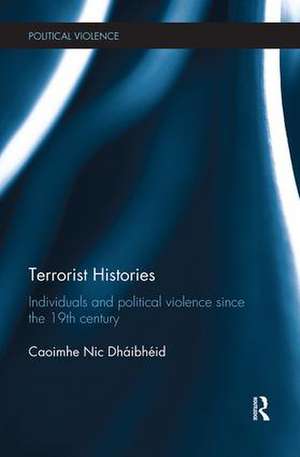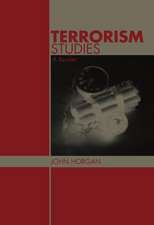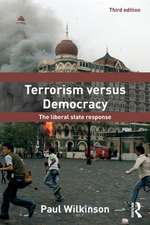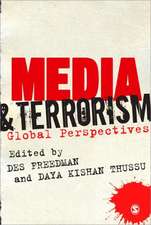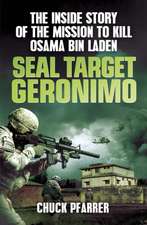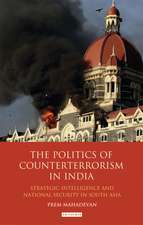Terrorist Histories: Individuals and Political Violence since the 19th Century: Political Violence
Autor Caoimhe Nic Dhaibheiden Limba Engleză Paperback – 8 mai 2018
Bridging historical methodologies and theoretical approaches to terrorism studies, it seeks to contribute to the developing historicising of terrorism studies. This is achieved principally through a prosopographical approach. In the preponderance of detailed statistical and quantitative data on the practice of terrorism and political violence, the individuals who participate in terrorist acts are often obscured. While ideologies and organisations have attracted much scholarly interest, less is known of the personal trajectories into political violence, particularly from a historical perspective. The focus on a relatively narrow cast of high-profile terrorist ‘villains’, to a large part driven by popular and media attention, results in a somewhat skewed picture; of equal value, arguably, is a more sustained reflection on the lives of lesser-known individuals.
The book sits at the juncture between terrorism studies, historical biography and ethnography. It comprises case studies of ten individuals who have engaged in political violence in the nineteenth, twentieth and twenty-first centuries, in a number of locations and with a variety of ideological motivations, from Russian-inflected anarchism to Islamist extremism. Through detailed empirical research, crucial themes in the study of terrorism and political violence are explored: the diverse individual radicalisation pathways, the question of disengagement and re-engagement, various counter-terrorist and counter-insurgency strategies adopted by governments and security forces, and the changing nature and perception of terrorism over time. Although not explicitly comparative, a number of themes resonate between the case studies, which will be drawn together in the conclusion to this book. These include the role of migration in radicalisation, the influence of radical family heritages, the experience of imprisonment and the narratives which individuals construct to tell their own terrorist life-stories. It also provides an historically grounded answer to one of the most contentious and heated debates in recent literature on terrorism studies: ‘what leads a person to turn to political violence?’ In examining the life-narratives of a diverse range of men and women who at some point embraced violence, this book seeks to contribute to a growing understanding of the entire arc of a terrorist lifespan, from radicalisation to mobilisation, to disengagement and beyond.
This book will be of much interest to students of political violence, terrorism studies, security studies and politics in general.
| Toate formatele și edițiile | Preț | Express |
|---|---|---|
| Paperback (1) | 300.29 lei 6-8 săpt. | |
| Taylor & Francis – 8 mai 2018 | 300.29 lei 6-8 săpt. | |
| Hardback (1) | 1056.28 lei 6-8 săpt. | |
| Taylor & Francis – 18 oct 2016 | 1056.28 lei 6-8 săpt. |
Din seria Political Violence
-
 Preț: 280.17 lei
Preț: 280.17 lei -
 Preț: 325.72 lei
Preț: 325.72 lei -
 Preț: 280.14 lei
Preț: 280.14 lei -
 Preț: 317.26 lei
Preț: 317.26 lei - 18%
 Preț: 1112.21 lei
Preț: 1112.21 lei -
 Preț: 470.07 lei
Preț: 470.07 lei -
 Preț: 387.57 lei
Preț: 387.57 lei - 22%
 Preț: 325.02 lei
Preț: 325.02 lei -
 Preț: 348.10 lei
Preț: 348.10 lei -
 Preț: 410.46 lei
Preț: 410.46 lei - 13%
 Preț: 296.19 lei
Preț: 296.19 lei -
 Preț: 408.00 lei
Preț: 408.00 lei - 18%
 Preț: 1112.90 lei
Preț: 1112.90 lei -
 Preț: 485.46 lei
Preț: 485.46 lei -
 Preț: 393.24 lei
Preț: 393.24 lei -
 Preț: 490.40 lei
Preț: 490.40 lei -
 Preț: 416.52 lei
Preț: 416.52 lei - 18%
 Preț: 1113.12 lei
Preț: 1113.12 lei -
 Preț: 494.07 lei
Preț: 494.07 lei - 8%
 Preț: 389.21 lei
Preț: 389.21 lei -
 Preț: 435.21 lei
Preț: 435.21 lei - 12%
 Preț: 306.13 lei
Preț: 306.13 lei -
 Preț: 442.83 lei
Preț: 442.83 lei - 18%
 Preț: 1444.61 lei
Preț: 1444.61 lei - 18%
 Preț: 1112.53 lei
Preț: 1112.53 lei -
 Preț: 391.50 lei
Preț: 391.50 lei - 18%
 Preț: 1278.08 lei
Preț: 1278.08 lei -
 Preț: 317.26 lei
Preț: 317.26 lei - 17%
 Preț: 243.29 lei
Preț: 243.29 lei - 18%
 Preț: 1113.16 lei
Preț: 1113.16 lei - 30%
 Preț: 326.14 lei
Preț: 326.14 lei -
 Preț: 447.17 lei
Preț: 447.17 lei -
 Preț: 209.56 lei
Preț: 209.56 lei - 30%
 Preț: 847.31 lei
Preț: 847.31 lei - 18%
 Preț: 1173.97 lei
Preț: 1173.97 lei
Preț: 300.29 lei
Preț vechi: 341.95 lei
-12% Nou
Puncte Express: 450
Preț estimativ în valută:
57.46€ • 60.15$ • 47.54£
57.46€ • 60.15$ • 47.54£
Carte tipărită la comandă
Livrare economică 05-19 aprilie
Preluare comenzi: 021 569.72.76
Specificații
ISBN-13: 9781138602823
ISBN-10: 1138602825
Pagini: 266
Dimensiuni: 156 x 234 x 24 mm
Greutate: 0.49 kg
Ediția:1
Editura: Taylor & Francis
Colecția Routledge
Seria Political Violence
Locul publicării:Oxford, United Kingdom
ISBN-10: 1138602825
Pagini: 266
Dimensiuni: 156 x 234 x 24 mm
Greutate: 0.49 kg
Ediția:1
Editura: Taylor & Francis
Colecția Routledge
Seria Political Violence
Locul publicării:Oxford, United Kingdom
Public țintă
Postgraduate, Professional, and UndergraduateCuprins
Introduction
- Alexander Berkman
- James O’Donovan
- Jean Garcin
- Amichai Paglin
- Gudrun Ensslin
- Jackie McDonald
- David Lane
- Omar Hammami
- Daniel McGowan
Descriere
This book addresses provides a series of in-depth portraits of men and women who have been labelled ‘terrorists’, from the 19th, 20th and 21st centuries.
